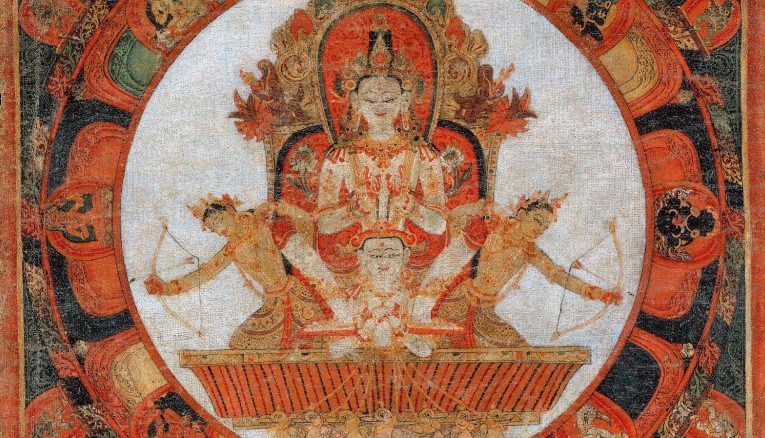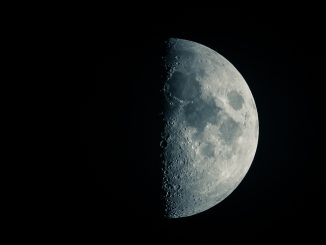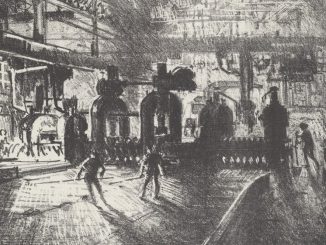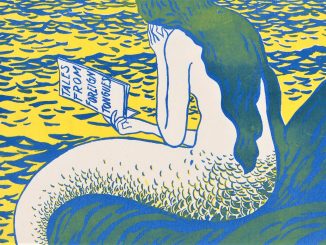
Conversation with Richa Pokhrel about her blog Nepali Chhori, the vulnerability of personal essay writing, and being a Nepali woman in today’s world.
RICHA POKHREL is a nonprofit professional. She is originally from Nepal. Her work has been featured in Duende, LA Lit, and Wendy Angulo Productions. In her free time, she likes to read, cook, hike with her dog and husband, and make up stories. She also edits Nepali Chhori, a blog dedicated to talking about issues affecting Nepali women, such as internal struggles regarding identity, cultural barriers, independence, living abroad, and being a Nepali woman in today’s world.

Julián Esteban Torres López: Imagine you’re a character in a story you’re writing. How might you introduce yourself?
Richa Pokhrel: A petite woman turns on the radio to listen to one of her favorite programs on a sunny Saturday morning. She has a large mug of tea in her hand, her wet hair wrapped in an old cotton T-shirt. Her black dog comes to sit by her side and she goes to sit on her worn couch. Her tan fingers run over her dog’s thick, black fur. Thoughts of yesterday play in her mind, going back and forth even though she already made a decision. She sits and ponders, letting the voices through the radio drift in and out.
Saturdays are her favorite because she allows herself to plan little and let the flow of day guide her.
JETL: You’re originally from Nepal. What does being an immigrant mean to you?
RP: An immigrant is someone who leaves a part of themselves behind in a place they knew as home and comes to another place to find a new part of themselves, thus creating a new home. In the future, the immigrant hopes that these two parts can come together harmoniously.
JETL: Do you ever envision what your life would have been like if you had never moved from Nepal?
RP: I used to think about this a lot. When I was younger, I always thought Nepal to be slow in modernizing mindsets, but when I go back to Kathmandu, so much has changed since I used to live there. If I had grown up in a rural part of Nepal, my life would be completely different, but I grew up in the capital. I imagine that I would have probably gotten married earlier and had a few kids by now. I think I would have a career of some sort—my parents have always encouraged education—but I am not sure how independent I would actually be. I don’t think I would be able to go out with my girlfriends at night. My husband would probably handle all my finances, I may have lived with my in-laws for a few years. I highly doubt I would be as progressive as I am now. Life for many women and girls in Nepal has changed, but that is only for a small percentage, those in wealthier families who live in the cities, who have access to education and opportunities outside the country.
JETL: What is Nepali Chhori?
RP: Nepali Chhori means Nepali daughter. It is a place where Nepali women can come together and talk about issues that affect us. It is a place that is open to everyone who wants to learn and share. Being a daughter can mean many things to different people, so it’s a way to explore ourselves. When I was thinking about creating this blog, I didn’t want it to be just my writings because I wanted to build a network of Nepali women who could also be friends. When I first moved to America, I did not have one single Nepali female friend, and I so wanted that.
JETL: Why did you create Nepali Chhori?
RP: I created Nepali Chhori because I couldn’t find a place for Nepali women like myself on the internet. Yes, there are tons of women’s blogs and websites, but they weren’t always where I felt like I could be myself. There are South Asian women’s blogs, but not specifically Nepali women-focused. I also wanted to create a place for women to write, even if they don’t consider themselves writers. A lot of women’s websites focus on beauty, style, food, things that I am interested in, too. However, I didn’t want those things to be the main focus of Nepali Chhori.
JETL: What kinds of stories can readers find on Nepali Chhori?
RP: Mostly the blog pieces are personal essays and they vary from very personal issues to general issues that Nepali women experience, like arranged marriages, career goals, sexual harassment, motherhood, and much more. Most all the stories have universal themes so even if you are not a Nepali woman, you are able to relate to them. There are also interviews with Nepali women who inspire me. I’ve tried to include works of fiction, but mostly it’s nonfiction.
JETL: Which Nepali women inspire you, either women you’ve interviewed or look up to?
RP: Firstly, I am inspired by my mom and grandmothers from both sides of my family. I have a lot of strong women in my family, I feel lucky to have that. The Nepali women who are my close friends are also very inspiring in their own ways. I am surrounded by very strong, independent, and opinionated women. I am hugely inspired by Nepali women who write, like Manjushree Thapa, Subina Shrestha, and Jhamak Ghimire. I am also really inspired by Nepali women athletes, like Mira Rai and Dawa Yangzum Sherpa for their incredible strength.
JETL: Which are some of your favorite pieces by other authors on Nepali Chhori?
RP: There are so many good pieces to choose from! I really loved the series “Diaries of a British-Nepalese Bride” because the writer, Bandana Upadhya, was really able to be vulnerable in her writing. She wrote a few posts during her first year of marriage and each post was great, it really dove into questions and issues that newlyweds face. It was nice that she shared so much with the readers because I am sure a lot of us could relate.
JETL: Your personal pieces and those of others on Nepali Chhori are also very vulnerable, as they tackle many internal struggles regarding identity, cultural barriers, independence, living abroad, and being a Nepali woman in today’s world. What do you find is the most difficult thing about writing memoirs than other kinds of writing?

RP: Writing personal pieces is hard because you have to be vulnerable with yourself and your audience. Sometimes it’s hard for me to be truthful to myself and then having to share all my insecurities and mistakes. Sharing feelings is even harder. However, after having shared more personal pieces, I have seen that it also allows doors to be opened and other people to share their own experiences. I think it has helped with my relationships with my family because they are able to get to know me a lot better. Certain topics don’t become taboo anymore. It’s helped me realize that I am never alone in my experience and there are other people who have gone through similar things. It helps to open up.
JETL: What’s your favorite piece you’ve written?
RP: My favorite piece I have written for the blog is “No One Passion,” because it was the moment that I accepted the fact that there is not one thing that is driving me. My career has been all over the place and I still don’t quite understand what I want to do, and I am finally okay with being able to discover that and try new things. My other favorite piece is my short story called “Mother Tongue,” which was published on Duende. It took me so many months to write less than 1,500 words. It is sort of a story between me and Nepal and the strains in that relationship.
JETL: Can you elaborate more on your piece “Mother Tongue”? What is your relationship with Nepal? Why is your relationship strained?
I love Nepal so much, but it’s not the easiest place to be a woman. I try to go back every few years to see my huge family and also get to know the country better. No matter what, I always feel like an outsider there even though I can speak the language. There are a lot of cultural nuances I don’t get because I didn’t grow up there. I wouldn’t say the relationship is strained, just that it has tension sometimes.
JETL: What are the personal essays you’re currently working on about?
RP: I am about to go through a big change in the next few months, so I have been writing about that, trying to process those feelings. I am moving across the country to the other coast to start a new chapter in my life. Moving is never easy, so my emotions are all over the place. It helps to put it down on paper.
JETL: What advice would you give writers who either want to get better at writing memoirs or those who want to write their first memoir?
RP: Just start writing! Also, read a lot of memoirs so you can see different styles. I absolutely love reading David Sedaris and I love how he shares his personal stories. Joan Didion, on the other hand, writes much differently, but the way she does it really brings you in. When I write about things in the past, I also talk to my parents and friends to get more details and facts. How we remember things might be different from what others remember.
JETL: What advice would you give immigrant writers?
RP: We are important and vital to the beauty of America. Don’t let fear or doubt get in the way of sharing our stories.
JETL: What are you reading right now?
RP: I’m reading Parable of the Sower by Octavia Butler for my women of color book club and Notes of a Native Son by James Baldwin. I mostly read fiction, and mostly by women. I love anthologies and short stories collections. I have a hard time reading nonfiction for some reason. I think it has to do to with the fact that in graduate school I read a lot of nonfiction books and since then I just haven’t had the inkling to pick them up.
JETL: What novel changed your life?
RP: Hard question! One novel that changed my life is The Namesake by Jhumpa Lahiri. This was the first book I read where I saw myself and my family in the pages. I was able to relate to the main character, Gogol. It changed my life because it made me feel less alone. It’s amazing what seeing yourself in books and movies will do to one’s sense of self.
JETL: Who are your influences?
RP: Oh gosh! In terms of writers, David Sedaris, Chimamanda Ngozi Adichie, Jhumpa Lahiri, and Barbara Kingsolver. They all have different writing styles, but they are all amazing at craft and telling a good story.
JETL: Are you writing on any specific topics right now?
RP: I am working on some personal essays that aren’t for Nepali Chhori. I am trying to get over my fear of submitting to other publications. I also have some fiction pieces, but right now nonfiction has been what I have been spending my energy on. One personal essay I am working on right now is about moving across the country. So many emotions in this change. As for fiction, I have been working on a ghost story for over a year now. I’ve made so many revisions and haven’t quite liked the final product yet. Perhaps this is a sign I should move on and work on something new.
JETL: Where do you think your fear of submitting to other publications comes from?
RP: I don’t think anyone likes rejection, me especially! I take it so personally and my confidence plummets. Being rejected sucks! There is also a fear of judgment from others. My personal writings lay out things I am not easily able to express vocally. However, I am remembering that to be a writer, one needs to have a lot of rejections. I am trying to build that backbone and not take it so hard. All creatives have to go through a lot of rejection. Not everyone is going to like what we put out there, and that is okay. The more I submit and get rejected, the less fear I have.
JETL: Does Nepali Chhori accept submissions for publication consideration? If so, what’s the criteria and submission process?
RP: We accept publication only from women who identify as Nepali of any writing level and age. I want to encourage writing as a way to express ourselves and not let level hinder publication.
JETL: Where would you like to see Nepali Chhori in 5 years?
RP: This is a great question, actually. Last year, I was really excited about doing more, adding more visual content like YouTube videos and a podcast, but with a 9-5 job, it’s really hard to give all my time to Nepali Chhori. We only publish one to two pieces a month, and for me that is doable. I have always wanted it to expand and have more writers, and eventually, I would like someone else to take over.
JETL: What’s your secret talent?
RP: I am really good at remembering small details about people and their lives. However, when I have to remember important facts and figures, like science or history, I seem to always forget. One time, I went to the doctor because I thought something was wrong with my hearing, she told me that nothing was wrong with my hearing, I just chose to have selective hearing. Haha.
JETL: What should we be worried about?
RP: Climate change. Species are going extinct, ice caps are melting, summers are getting hotter, there are more storms, etc. It’s really easy to take our planet for granted and not think about what happens when we use all her resources. If we want our future generations to survive, then we really need to do more to save our planet. I know as individuals it feels overwhelming to think about the scope of climate change, but I try really hard to do small things and have also shifted my lifestyle in the last few years to be more environmentally friendly. These things include carrying a water bottle everywhere, getting a CSA (community supported agriculture) box, shopping at the farmers’ market, buying food items in bulk, buying used furniture and clothes, recycling electronics, taking the bus, reusing Ziploc bags, bringing my own grocery bags, not using plastic straws, there are many more. We already see the effects of climate change and it will get much, much worse if we don’t do anything about it.
JETL: What do you think is the greatest invention?
RP: Instant Pot. I love this multi-cooker pot. It’s changed how I cook and how often I cook. On a more serious note, vaccines are one of the greatest inventions.
JETL: What are you optimistic about?
RP: Future generations. I am very inspired by the younger generation because of how aware, smart, and confident they are. The teens who are part of March for Our Lives have been very inspiring. When I was their age, I was so unsure of what I believed in, but seeing young people who live their lives with conviction gives me so much hope.
JETL: What makes you angry?
RP: Animal abuse and child abuse. Adults who take advantage of children and animals are just disgusting. I could say more about this, but it just makes me angry and sick to my stomach. I would like to point out that I am not a vegetarian or vegan, however. As a consumer, I do not buy any beauty and hygienic products that are tested on animals, nor do I buy meat from big suppliers. I try to buy meat from local farms who don’t participate in factory farming.
JETL: Can you share a happy childhood memory that still brings a smile to your face?
RP: I scored 17 points at a junior high basketball game and had my name in the paper. When I was younger, I was really into sports and worked hard to have some skills. I never made the A teams for either basketball or volleyball, but I was a really good player on the B team. This memory makes me happy because in junior high I seemed to be of average size, and when entering high school almost everyone was taller than me, so I stopped playing sports. Junior high was when I was good at sports. Also, I am not a very competitive person and I don’t do very well under pressure. This game where I scored so many points was a game that I didn’t let the audience get to me and just played like no one was watching.
JETL: If you’re in a new city, what do you like to do?
RP: Just wander around without an agenda and discover things without having to Yelp them first. I like stumbling upon things that I didn’t know were there. There is an element of surprise and it feels good to find those hidden treasures.
JETL: What’s your favorite city?
RP: Rome. For my 30th birthday, I went to Italy and I loved spending a few days in Rome. The city is just so walkable and there so many cobble-lined streets. I loved exploring. I never noticed how many miles I walked each day because there is so much to look at and see and discover. I find most European cities are like this, with so much history and beautiful architecture. My favorite part was stumbling over all the little cafes. Plus, I could eat all the gelato I wanted.

Julián Esteban Torres López is a Colombian-born journalist, researcher, writer, and editor. Before founding The Nasiona, he ran several cultural and arts organizations, edited journals and books, was a social justice and public history researcher, wrote a column for Colombia Reports, taught university courses, and managed a history museum. He’s a Pushcart Prize nominee and 1st place winner of the Rudy Dusek Essay Prize in Philosophy of Art. His book Marx’s Humanism and Its Limits was BookAuthority’s Best New Socialism Book of 2018. His micro-poetry collection Ninety-Two Surgically Enhanced Mannequins is not as serious in tone as his forthcoming book Reporting on Colombia: Essays on Colombia’s History, Culture, Peoples, and Armed Conflict.
Twitter: je_torres_lopez
Featured image: Nepal (Kathmandu Valley), “Mandala of Chandra, God of the Moon,” early Malla period, late 14th-early 15th century, distemper on cloth, Gift of Mr. and Mrs. Uzi Zucker, 1981, The Metropolitan Museum of Art.


